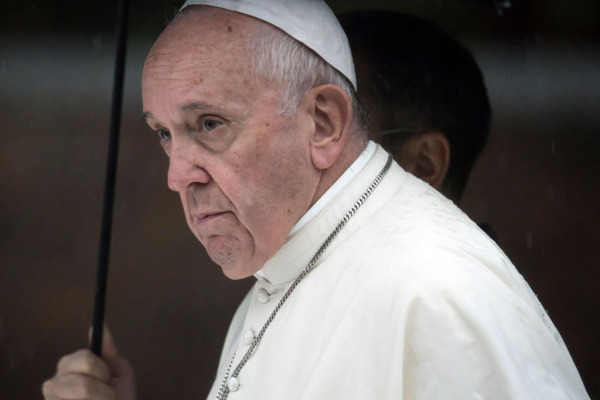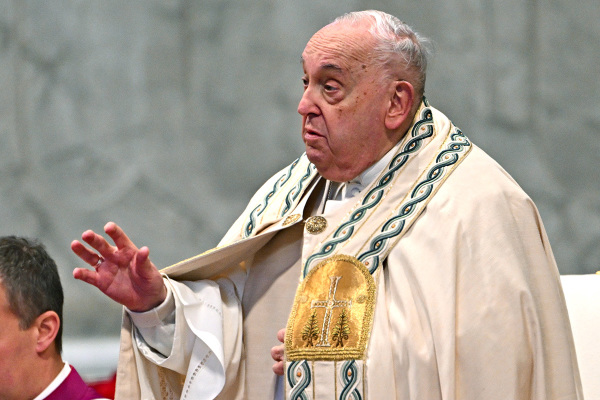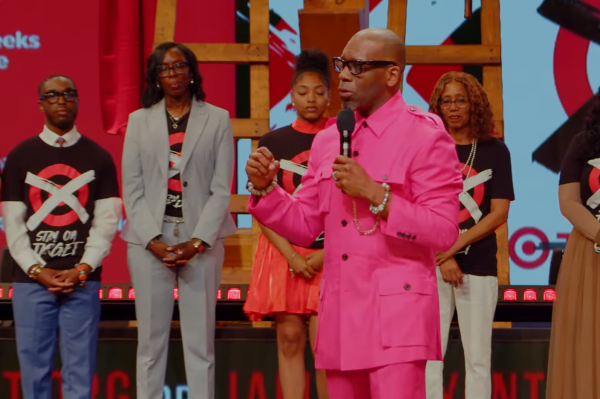March for Life participants optimistic for a post-Roe America: 'This is just the beginning'
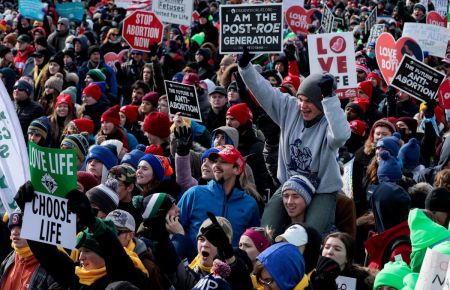
WASHINGTON — Participants at the 49th annual March for Life expressed optimism about the state of the pro-life movement as the U.S. Supreme Court is set to rule on a case that many believe could alter abortion legal precedent in the United States.
Despite single-digit wind chills, tens of thousands of protesters gathered on the National Mall Friday to declare their opposition to abortion at the first major pro-life rally to take place since the coronavirus pandemic broke out nearly two years ago.
Last year, the COVID-19 outbreak forced organizers to scale back the in-person event considerably as just a small group of pro-life leaders gathered in Washington, D.C., as many pro-life Americans tuned into virtual programming.
Following a rally and speeches from pro-life leaders and celebrities, participants marched roughly 1.5 miles to the U.S. Supreme Court. The march takes place every year in January around the anniversary of the 1973 Supreme Court decision Roe v. Wade, which found all state laws banning abortion unconstitutional, making the procedure a national right.
Last month, the Supreme Court heard oral arguments in the case of Dobbs v. Jackson Women’s Health Organization, where the state of Mississippi is asking justices to uphold a state law banning abortions after 15 weeks gestation.
A ruling in favor of Mississippi would chip away at the central holding of Roe and the court’s subsequent ruling in Planned Parenthood v. Casey that limited the ability of states to enact abortion restrictions.
Attendees of this year’s march from across the country spoke with The Christian Post about what they believe will happen in the next few months as a decision is expected by June.
Vincent Dicaro lives in the Washington, D.C. area and works for CareNet, a national nonprofit organization that runs pregnancy centers and churches throughout the U.S.
“In addition to being here for my job, I’m also here because ... I just want to support the march and support the idea of abundant life,” he said.
Dicaro is optimistic about what the outcome of the Dobbs case will be.
“From a legal advocacy perspective, it looks like a big victory is coming,” he predicted. “That’s not the end of the pro-life movement. That’s the end of the beginning of the pro-life movement, and then the next phase really starts, which is providing help to people who are going to need it when abortion is no longer available to them.”
Dicaro held a sign that read “pro-abundant life.”
“Christ, in John 10:10, says, ‘I came that they may have life and have it abundantly.’ So, because Jesus was pro-abundant life, we are too. So, we don’t want to just save babies from abortion, we actually want to also make sure that … they’re raising good strong families and have an opportunity to become disciples of Jesus Christ, and that’s what abundant life looks like, not just life.”
While the crowd included several veterans of pro-life activism who have attended the annual protest multiple times, many were participating in the rally for the first time this year.
Donald and Debbie Graham from Vancouver, Washington, were first-time attendees.
“I’ve wanted to come my whole life. I just retired, and here we are,” Debbie Graham joyfully proclaimed.
She characterized the prospect of the Supreme Court reversing or weakening Roe as “wonderful” and predicted that the justices “are going to agree to do that.”
After acknowledging that such a ruling would give states more authority to make abortion laws, Graham described the effort to advance the pro-life movement in her home state of Washington as “tough” but concluded that the pro-life movement in her state is growing. She thinks “people are waking up.”
“When it gets really, really dark and you start taking life, even outside of the womb, and we have administrations and governments promoting that, then … we know the light is soon going to come behind that because people are smart and they know in their heart the truth.”

Tom Tharp, the pastor of Emmanuel Baptist Church in Batavia, New York, said he attended the march for the first time this year to “stand up for the lives of the preborn.”
He declared that the “world seems to be turning more and more violently against them.”
Tharp said he is “very hopeful” about the possibility of a reversal of Roe.
“I know that if they do reverse it, it will send [the abortion question] back to the states,” he said.
He lamented the prevalence of abortion in his home state of New York, expressing concern that “it will probably just get worse there [rather] than better.”
“But I hope a lot of other places will get better,” he said.
Tharp rejoiced that the pro-life movement is becoming “more and more popular.”
“More and more people are waking up that babies in the womb are still babies, and they’re human beings distinct in every way from their mother and deserve life just like we deserve liberty and the pursuit of happiness in America,” he said.
This year’s March for Life also marked the first time that L.K. Shinneman from Carmel, Indiana, a member of the Catholic fraternal organization Knights of Columbus, participated in the event. He said Americans are “guaranteed life, liberty and the pursuit of happiness.”
“Without life, the other two aren’t possible,” he said.
Shinneman sees the March for Life as an opportunity “to tell our country and the people that lead it that murder is wrong, that Americans, even though they’re not born yet, have as much rights as every other American.”
Jake Gant, a student at the University of North Florida marching with his college’s “Catholic Ospreys,” had attended pro-life marches in other states. But the 2022 March for Life was his first time participating in the national rally.
“I actually hosted my own rally in my town in Cumming, Georgia,” on one occasion, he told CP.
“I think that this movement is on fire,” he added. “I think that we’re at the tipping point where we can finally, at the 50-year mark, undo Roe v. Wade.”
Crystal from Richmond, Virginia, had a daughter who “was born with a condition” that she believed would cause many people to abort her.
While her daughter has passed on, Crystal remains a passionate supporter of the pro-life cause and held a picture of her daughter at the rally as she stood alongside her husband and surviving children “to stand for life.”
Karis and Shannon, two middle school students and friends from Annapolis, Maryland, also attended. Shannon, holding a sign reading “My birth mother gave me up for adoption,” told CP that she was taught since she was little that “an unborn baby still has human dignity.”
“They all have the right to life, and … people shouldn’t abort them just for … their comfort” or because they “think they’re inconvenient,” she said.
The girls said they were attending the rally to march “for the babies that can’t.”
Reacting to the possibility of Roe’s reversal, Karis believes that “pro-lifers are finally … making a difference with the Supreme Court and in the country.”
She suggested that “it would be really cool” if “people [finally] realized” the evils of abortion.
Angie from Birmingham, Alabama, urged Supreme Court justices to “take into consideration that abortion is not women’s healthcare.”
She said she had “two friends who have had abortions.”
“And one of them is barren; she can’t have children,” she detailed. “And the other one lost two children.”
“It’s not women’s healthcare,” she continued. “It is not putting the women first.”
A handful of counterprotesters demonstrated their support for abortion rights during the rally.
One pro-abortion protester shouted through a megaphone, “women’s rights are human rights,” “thank God for abortion,” and “God loves abortion” as the crowd began to assemble on the National Mall. He also denounced the event as a coronavirus superspreader.
A handful of pro-life leaders who work to support the cause full-time shared their views about the pro-life movement. Brad Hahn works for Solidarity HealthShare, a network of about 25,000 individuals who participate in “alternative to health insurance” that does not require people to “to pay for contraception, sterilization or abortion.”
Hahn pointed to the progress made by Republican presidents in appointing justices more sympathetic to the pro-life movement to the Supreme Court and the lower courts as a cause for optimism.
“So I think that work that started with Ronald Reagan and the two Bushes and that whole movement to get qualified justices that have [a] like mind is really coming to fruition now and I think that’s what’s leading up to … this Supreme Court case,” he said.
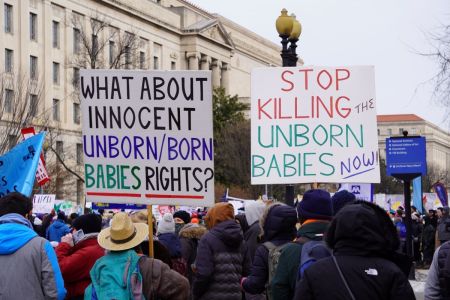
Penny Young Nance of the conservative advocacy group Concerned Women for America told CP that the pro-life movement is “very optimistic.”
“And as the head of the nation’s largest public policy women’s organization, we are jubilant,” she said.
“Of course, we don’t have a crystal ball to see what the Supreme Court is going to do, but we strongly believe that the time has come to take down Roe v. Wade and to throw the issue back to the states,” she stressed.
Nance, whose organization advocated strongly for the confirmation of Justice Amy Coney Barrett to the Supreme Court, reflected on the role that the conservative makeup of the court may play in the outcome of the Dobbs case.
“The fact that we have three Trump appointees is … the only reason we even had a chance with the court,” she said. “Because of those three justices, we have a very good chance of changing the course of history and protecting the unborn.”
Nance maintained that a favorable ruling in Dobbs would not mark the end of the pro-life movement.
“It’s just the beginning,” she proclaimed. “We have to take this battle to a state-by-state issue.”
Mallory Quigley of the pro-life grassroots lobbying organization Susan B. Anthony List said, “the pro-life movement has grown leaps and bounds in these last 49 years.” She specifically cheered the growth of the “pregnancy center movement,” where crisis pregnancy centers are “providing millions of dollars worth of services to women [and] their families who are facing unexpected pregnancies.”
“Their work will become even more important post-Dobbs, post-Roe,” Quigley insisted.
Dr. Michael New of the Catholic University of America and the Charlotte Lozier Institute, the research arm of Susan B. Anthony List said, “we’ve done very well building a culture of life, even with Roe v. Wade in place.”
“We’ve gotten the abortion rate down by 53% since 1980, and I think that if we get a favorable ruling in Dobbs, we will be able to build on those gains,” he asserted.
A ruling in favor of Mississippi in the Dobbs case would constitute a “great victory,” he said, but “we still have our work cut out for us.”
He cited the increase in chemical abortions and advocacy on behalf of crisis pregnancy centers as causes the pro-life movement can get behind in a post-Roe America.
Terrisa Bukovinac, the president and founder of the Progressive Anti-Abortion Uprising and a progressive pro-life atheist, reflected on the fact that no sitting Democratic members of Congress spoke at the rally.
“It’s devastating,” Bukovinac said. “I think that … we’ve been seeing this trend over the last 20 years where almost every single pro-life Democrat has been pushed out of Congress.”
That activist suggested that even though no pro-life Democrats currently sit in the U.S. House of Representatives, that would soon change.
“We have a Democratic, progressive, pro-life candidate running as the frontrunner in Bobby Rush’s district,” she said. The candidate she mentioned, Pastor Chris Butler, is seeking to represent Illinois’ 1st Congressional District, a district that the pro-choice Democrat Rush has represented for decades.
Ryan Foley is a reporter for The Christian Post. He can be reached at: ryan.foley@christianpost.com











